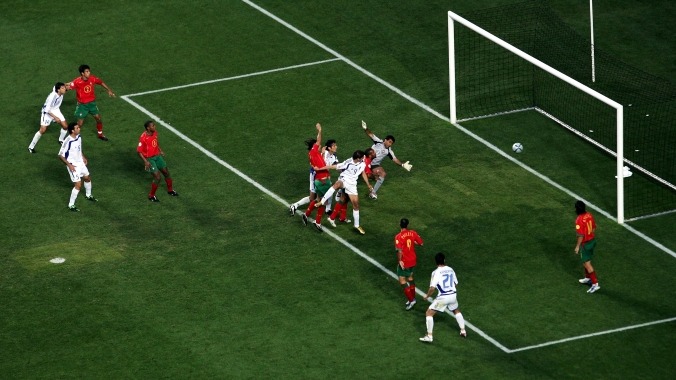Remembering a Play: Modern Greece’s 11 Gods Make History at the Euros
Photo by Shaun Botterill/Getty Images
Today is a big day at the 2024 European Championships. As I write this, Spain and Germany are playing a classic in the quarterfinals ahead of the afternoon’s Portugal and France contest, which helps point this Remembering a Play in a topical direction.
Like many older millennials, I first got into soccer at the 1998 World Cup, and by the 2004 European Championships, I had obtained just enough knowledge as a casual fan to understand the stakes and the players and their relative power.
Greece was not on my radar whatsoever. I knew nothing about them, because why should I? A team that had never won a game in any major international tournament would never make it through our shallow filtered soccer programming across the pond, especially in that pre-social media era.
Greece came into the tournament at 150-1 odds to win, and instantly made their mark, beating host Portugal 2-1 in the opening game, with Cristiano Ronaldo scoring a goal in the 93rd minute to doll up the scoreboard a bit. I staked out an early anti-Ronaldo position in my nascent soccer fandom (for reasons I still can’t quite remember given he was just 19-years-old in this tournament and had yet to create lots of reasons to hate him), and was instantly sold watching Greece make him sad. I decided that day they would become my adopted Euro team.
Next, they tied mighty Spain before losing to Russia, but it was still enough to get them out of the group stage, leaving the Spaniards on the outside looking in. Greece faced France in the knockout round, and many figured that this would be the last chapter written in the Cinderella story. Instead, the Greeks put on a defensive clinic, winning 1-0 to advance to the semifinals against the Czech Republic, where they again won by their signature score as I pretended to understand advanced defensive tactics while inviting anyone willing to join me on the bandwagon.
The easiest way to get a casual American sports fan’s attention is with a Cinderella story, and I was all in. I have no known Greek in my lineage but for that tournament, I may as well have self-identified as TZEIKOMP (Jacob in Greek, so this website tells me), and I would repeat the saying written on their bus “Ancient Greece had 12 Gods, Modern Greece has 11” to any and all who would listen.
A rematch with Portugal in the European Final in Lisbon felt like the gods themselves were authoring this tale, and when Angelos Charisteas banged home a header in the 57th minute, I joined Zeus, Apollo, Athena and an entire nation of ten million people in absolutely losing my freaking mind.
Greece held on to win 1-0 yet again, winning the most improbable European Championship in history, and creating some absolutely goosebump-inducing scenes.
Writing out all the Euro winners is the ultimate “one of these things does not belong” exercise, as it is jarring to read them in this succession since 1960: Soviet Union, Spain, Italy, West Germany, Czechoslovakia, West Germany, France, Netherlands, Denmark, Germany, France, Greece, Spain, Spain, Portugal, Italy.
It’s always fun as a casual fan when the best teams and players play each other, and there is no doubt that today’s matches between previous champions Portugal and France and Spain and Germany will be some of the highest-rated of the tournament by attracting inconsistent eyeballs like mine.
However, how many casuals really remember Spain’s 2012 Euro championship? Or France’s 2000 title? The lone drawback to perpetual greatness is that some great moments can struggle to stand out as the heedless march of time creates distance from them, as there are so many Spain and France highlights at high level tournaments that they all tend to bleed together in the casual’s memory. A run like Greece’s leaves an indelible mark on history. There have been many great moments at the Euros, but none can match the moment and emotion created by Angelos Charisteas’s emphatic 57th minute header twenty years ago.